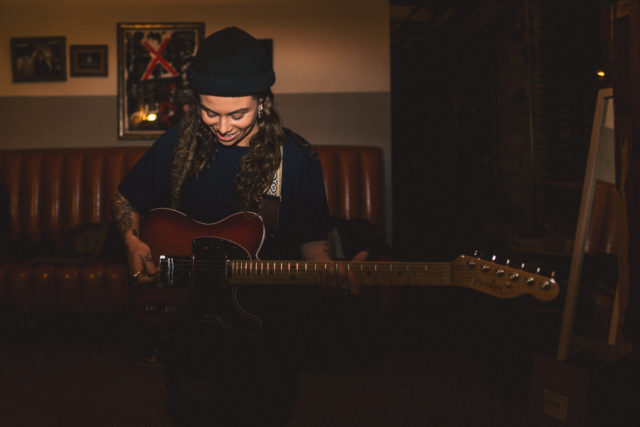
About a year ago, Tash Sultana had to press pause — the world was eating them alive, consuming the young Australian multi-instrumentalist’s talent as fast as Sultana could serve it up.
“I had to stop the entire world around me recently,” Sultana (who uses gender neutral pronouns they, them and theirs) wrote in a Facebook post in September of last year. “It all got a bit too much being away from home, family and friends. Living on the road for the last two years has been so testing. Wonderful however. But sometimes I just went into overload trying to play as many shows as possible for as many people as possible, to spread my message of positivity.”
Sultana started playing guitar at 3 years old, so to call their rise to fame an “overnight success” would be an insult to the years of work Sultana — now 23 — has dedicated to the craft. But the ascent was dramatic anyway you slice it.
In 2016, the world fell madly in love with Sultana after a Go-Pro-filmed bedroom jam session of their song “Jungle” went viral. Clad in black, an Olympic White Fender Jazzmaster slung low, a backward-facing ball cap restraining a cascade of beach-tousled curls, the 5-foot-2-inch Sultana bops and weaves between a looping station and a series of pedals, building the reggae-tinged rock song layer by layer. A couple of minutes in and Sultana is singing, their voice sweet and just a little gritty, like the bottom half of a glass of milk after a few cookies, their face contorting into impassioned snarls and dimpled smiles from the sheer bliss of creating.
Nearly eight minutes later, you’re in love.
Five days and a million views later, everyone was in love.
Sultana soon released a six-track EP, Notion, and launched an international tour. Capable of playing more than 15 instruments — some accounts say 20, all self taught — Sultana easily clocked two-hour sets. They hadn’t even released a full album yet.
But the struggle to feed the masses was real.
“I ran out of energy and my soul was tired and I was scared for my life how dark my mind got,” Sultana continued in the Facebook post. “I thought I was going to die from the shadow my mind cast. Then I got help. And it’s so … important that you listen to your mind and the voice within, when you are suffering reach out. The light is always within your grasp if you … fight. Run, swim, surf, skate, paint, read, write, jump into the ocean, learn an instrument, cry your … heart out. And REACH OUT (sic).”
Sultana’s vulnerability is their not-so-secret weapon, as crucial a component to their success as their musical dexterity. Sultana has been open about drug addiction, depression and their non-binary gender identity, becoming, whether they were ready for it or not, emblematic of a rising generation that values barefaced authenticity and inclusion.
When Sultana was 17, they say a dose of magic mushrooms induced psychosis. It was a trip so gnarly, Sultana had to call their dad to come get them from a friend’s house. Back home, the teen watched a David Attenborough documentary with their parents, riding out the trip, questioning “why tortoises lived for so long and whales lived for so long when there was no purpose of life.”
It took nine months for Sultana to find their way out of the darkness of that psychosis — music was the light, they say — but the damage was done. Sultana continued to use drugs and drink to cope with depression.
Several years later, Sultana reported having breaks from reality while on tour in 2017, so they stopped the tour and went back home to Melbourne. There was therapy — lots of therapy — and downtime with their girlfriend, surfing, skate boarding, reading. They became a health ambassador for Beyond Blue, an Australian nonprofit that supports people with anxiety and depression.
“I think it’s really important to have a journey and talk about your healing process, because people are looking for answers and if you [have any] then you should share that knowledge,” they told Billboard last year. “You only have one thing in your mind and that is your mind; once that’s gone, your whole reality is distorted.”
In August, Sultana released their first full-length album, Flow State, a title that refers to the blissed out mental state people reach when they are totally absorbed by their craft… the way Sultana is when they perform. The message is more self-assured than those from the Notion EP, but there are still endearing flashes of adolescent confusion. It’s a blend of hip-hop, blues, psychedelic rock and reggae, the kind of musical and cultural mash-up that represents the inclusive world Sultana champions, both in their lyrics and their actions.
Sultana is an act you have to see to believe. Alone on stage, tendrils of smoke from incense curling around Himalayan salt lamps, Sultana dazzles audiences as they pull instrument after instrument from their bag of tricks, creating a solo symphony of sound.
Before they start any live show, though, they set some ground rules.
“If you’re homophobic, get the fuck out of my gig!” Sultana yells out early in the set. “If you’re racist, get the fuck outta here. And if you’re transphobic, get the fuck out.”
Weather Sultana knows it or not, they are co-leading a generation that will accept nothing less. Sultana’s homegrown brand is built on a foundation of inclusion, not unlike the crop of progressive political figures sprouting in the States.
Is Tash Sultana a musical Alexandria Ocasio-Cortez? No, but they’re both important to building a new world — a kinder world. They’re both the kind of unrepentant rebels this world needs.














